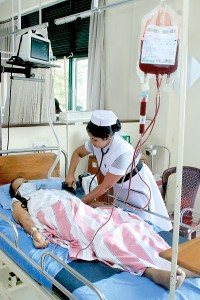News
Dengue prepares nasty surprise for health officials

A patient suffering from dengue receives treatment
Thousands of people are still falling victim to dengue and infections will worsen this year surpassing last year’s record tally, officials warn.
So far this year, 1,311 infections have been reported to the Epidemiology Unit of the Ministry of Health. Most of the cases are from Colombo, Jaffna, and Galle.
Dengue infections last year reached a record 54,727 compared with 29,777 patients in 2015.
“There will be a 25 per cent increase in the incidence [of dengue] than the previous year,” Dr Preshila Samaraweera, director of the National Dengue Control Board, said.
In December last year, 7,256 cases of dengue were reported, with 2,377 of the cases in Colombo. This was the highest tally since July 2016, when there were 10,715 infections.
The Aedis aegypti mosquito, which carries the dengue virus matures rapidly in hot weather, and the current unseasonably hot spell could trigger an increase in the mosquito population.
Dr Samaraweera promised to continue “efforts to suppress the dengue mosquito by closely and monitoring’’ and to act against “potential breeding habitats”.
Public health officials say 16 per cent of premises inspected by the Ministry of Health in last month were found to be responsible for spreading dengue.
Despite eradication programmes and clinical management, there has been no reduction in dengue. Cases in 2016 were the highest since 1992.
But in Ampara there were no dengue cases so for this month.
The development officer of the health branch at the Ampara Urban Council, G. Priyanthi, said disease control was a two-way process, where the public and the health officials should co-operate. “It is the responsibility of the Health Ministry to implement and sustain effective long-term strategies to target the vector and manage the transmission of dengue,’’ she said.
Proper solid waste disposal and water storage methods are an important part of vector control. This includes removing or covering open containers to reduce breeding grounds for mosquitoes.
Surveillance should be proactive, she said.
Even if only a couple of people fall ill with dengue, the authorities should immediately visit the house and the locality to clean up and spray insecticide. At present, preventive measures are taken only when a death occurs – this is too late, she said.
“Stagnant water includes sources like open drains and any water stored in the household — bathrooms, kitchens and coolers. Household potted plants like money plants which absorb water slowly can be sources of mosquito breeding”, Colombo Municipal Council (CMC) Chief Medical Officer of Health Dr. Ruwan Wijayamuni said.

